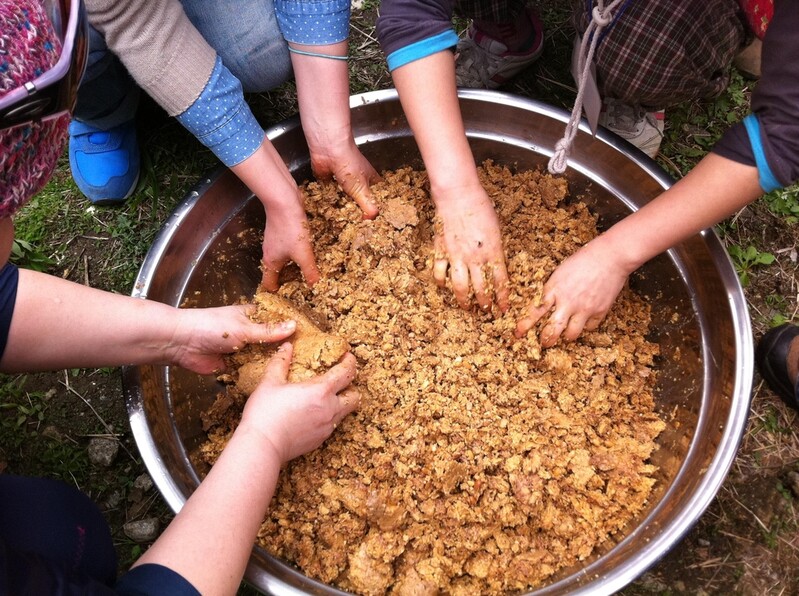 |
| ▲This photo shows Pyongyang Laengmyeon. (Yonhap) |
 |
| ▲This photo shows Baguette. (Yonhap) |
 |
| ▲This photo shows volunteers making Kimchi. (Yonhap) |
 |
| ▲This photo, provided by Cultural Heritage Administration, shows making Jang. (PHOTO NOT FOR SALE) (Yonhap) |
 |
| ▲This photo, provided by Cultural Heritage Administration, shows that Talchum has become Korea's 22nd Intangible Cultural Heritage. (PHOTO NOT FOR SALE) (Yonhap) |
SEOUL, Dec. 1 (Yonhap) -- Pyongyang Naengmyeon, Baguette, traditional plum hard liquor...
As the traditional Korean mask dance, or "talchum" in Korean, was inscribed onto a UNESCO Intangible Cultural Heritage list Wednesday, other cultural heritages which are also to be listed are gaining attention.
The efforts to protect the ancestors' hand-made foods are attracting attention as foods that represent each countries and cultures revolving around them are being inscribed on to the list recently.
What caught eyes in this year's meeting was North Korea's Pyongyang Raengmyon custom."
Pyongyang Naengmyeon, which was also served at 4.29 Inter-Korea Summit Talks in 2018, is one of the main foods that represent North Korea.
According to the North Korean Folklore Research Institute of the Social Science center, Pyongyang naengmyeon is a special dish in Pyongyang that is made by pouring savory noodle soup with various garnishes to noodles made from buckwheat flour dough.
The committee decided to register the "Pyongyang Langmyeon custom" on the list at the meeting, saying, "Pyongyang Langmyeon is a traditional folk dish deeply rooted in the lives of the people of Pyongyang, which promotes cultural identity and continuity and contributes to social harmony and solidarity."
North Korea now has four UNESCO Intangible Cultural Heritages: Arirang (2013), Kimchi making (2014), Korean Wrestling, or "Ssireum" in Korea, (2018, South and North Korea co-registered), followed by Pyongyang Naengmyeon (2022).
France's national bread, Baguette, also challenged itself to be listed on the list.
There is a statistics that around 10 billion baguettes are sold annually in France, but recently, there are raised concerns that breads made by craftsmen are now being replaced by baguettes produced in large quantities in factories.
In addition, Serbia's "social practices and knowledge related to preparing and drinking traditional plum distilled liquor - Schulzibovica," 15 countries including the United Arab Emirates (UAE)'s "date palm, knowledge, technology, traditions and practices" and Saudi Arabia's "knowledge and practices related to growing Khawlan coffee beans" will be decided at the meeting.
All the nominees including the Baguette are widely expected to be inscribed on the list as they went through a recommendation for inscription from the committee's evaluation body. THe evaluation will be done in order.
The value of food's cultural value has been positively evaluated since the 2010s is the popular opinion of the cultural world.
Park Won-mo, head of UNESCO Intangible Cultural Heritage, mentioned.
Park Won-mo, director of the UNESCO Asia-Pacific Intangible Heritage Center, pointed out in a report published in the 12th issue of the academic journal "Intangible Heritage" published by the National Institute of Intangible Heritage, "The atmosphere has reversed at the 2010 registration."
Director Park explained, "In the early days, the executive office and subsidiary organizations were negative about listing food related items due to concerns over commercialization, but in 2010, three cases including "French gourmet culture" were listed."
Korea directly went through this flow of change.
The "Joseon Dynasty Royal Cuisine" was suspended from listing in 2009 due to the reason that it can not be utilized commercially, but "Gimjang : Culture of making and sharing Kimchi" was listed on the representative list in 2013.
Park analyzed that "Evaluation over food items have been relatively generous after 2010 and other than foods provided at festivals and events, numerous food related items are being listed until today."
Cultural Heritage official said "Formerly, various foods or eating cultures did not make the representative list, but that tendency has changed," adding, "But the voice looking out for excessive commercialization is steady."
For numerous cases that made the list, the committee specifies that "potential negative effects like excessive commercialization must be dealt properly.
Korean government is keeping a keen eye on recent listing as they prepare for "23rd Intangible Cultural Heritage."
Cultural Heritage Administration has previously requested "Korea's tradition Jang culture" based on "Making Jang" as the nominee for representative list. The decision will be made in 2024.
Why 2024 instead of 2023.
In order for many countries to list their Intangible Cultural Heritages, UNESCO puts countries with least number of listings as the priority. Country with various listings are limited to only one in two years.
According to the data by "2022 Intangible Cultural Heritage list," Korea has 21as of July 1, being the third country with the largest number of listings, after China (34) and Japan (22).
(This article is translated from Korean to English by Jiwon Woo.)
(END)
(C) Yonhap News Agency. All Rights Reserved
















![[동포의 창] 도쿄샘물학교, 31일 학예발표회 개최](https://korean-vibe.com/news/data/20260130/yna1065624915997771_247_thum.jpg)






